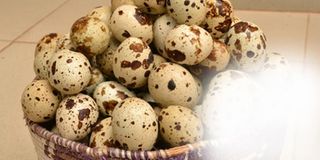Prime
The truth behind so-called magic foods

What you need to know:
From time to time, health enthusiasts get caught in a wave of excitement with what is often thought to be miracle foods or natural cures. Sandra Janet Birungi and Eseri Watsemwa examine some popular trends.
You have probably heard of the different health trends that are popping up here and there claiming to have some magic cure for different diseases. According to Jamiru Mpiima, a nutritionist at Family Nutritionist Uganda, the public has to be careful because some are not realistic.
“Most of these trends are being promoted for individual gain. Diseases have changed over time and they become harder to treat. Since people are affected by them, they look for alternatives and they end up indulging in these trends,” Mpiima cautioned.
But what are those trends which people have jumped on, thinking they are magical?
Quail eggs
Quail eggs have been said to have more nutrients than chicken eggs. There are claims that the eggs can cure impotence, allergies, typhoid, hypertension and diabetes among others.
According to James Mulira, a nutritionist at Action for Nutrition (UGAN), quail eggs are on high demand due to the myth that they cure several diseases.
In supermarkets, quail eggs are almost thrice the price of chicken eggs, costing on average, Shs20,000 per pack of 20 eggs. “They have alleged medicinal properties but none of these allegations have been proven by research. People have to know that there are people who sell these eggs and want to market them for people to buy them so they should be careful,” says nutritionist Mpiima.
However, he says, if it is proven that they have the alleged medicinal properties, people should know that they do not work magic and do not cure all diseases. He cited people with diabetes who are advised to take a dose of 100 quail eggs and said these have no formula for recommending such. He cautioned about their cholesterol levels saying they contain more cholesterol than chicken eggs.
However, Hope Nimurungi, a dietician at Africa Premier Health, says the quail eggs contain more choline which aids in brain development. According to Mulira, quail eggs contain proteins, vitamin A and B1, minerals, calcium, High Density Lipo Protein (HDL) and five times more iron and potassium compared to chicken eggs but the claim about healing all diseases has not been proven.
He added that regular consumption of quail eggs strengthens the immune system and also increases haemoglobin levels, helps in correcting anaemia and contibutes to healing of bleeding gums and liver problems.
However, he cautions that until enough research is conducted on quail eggs, people should not eat more than two quail eggs a day since it is not known how much is needed in our bodies.
Juicing
Juicing is a common trend and it is believed to have marvelous benefits such as the production of vitamin-rich juices and aiding weight loss. James Mulira, a nutritionist, says there are several kinds of juices such as single fruit juices, cocktails (mixture of different fruits) and purees (made from vegetables) and adds that these are all rich in vitamins C and A and minerals such as Potassium.
Juicing rehydrates the body and provides it with anti-oxidants which are vital chemicals therefore important in managing weight and cleansing the gastro-intestinal tract. Juice is also rich in fibre depending on the source.
He advises that people should take in as much juice as possible especially young children and the elderly, given the different varieties but eating a whole fruit is better. He also cautions that taking juice that has additives as preservatives may not serve the body with the required nutrients. Therefore, he recommends natural juice.
Mpiima says although juicing can be used for weight loss, it has short term effects and should only be used under supervision by a nutritionist. “Juicing is often used in juice diets and is used to help detoxify and lose weight. It should be taken for a very short period of time; less than a month, otherwise it will become dangerous,” Mpiima says.
He identifies dehydration, muscle loss and weak organs as some of the side effects of juicing as an alternative to a normal diet. Hope Nimurungi, a nutritionist, agrees, saying juices should not be taken alone because such a diet can be harmful to the consumer.
Green tea
With the move towards weight loss, green tea has come up as the “lazy way” to lose excess weight and also reduce the size of the stomach.
James Mulira, a nutritionist, says it is rich in polyphenols which are anti-oxidants that manage cardiovascular diseases, cancers and most chronic diseases and if taken after a meal, reduces fat which reduces the possible cases of obesity. Although there is no standard for the amount to be taken, Mulira urges users to take it moderate amounts.
Nutritionist Mpiima adds that green tea has the ability to reduce blood pressure by neutralising blood, help in making insulin work better hence helping in diabetes as well as easing indigestion, bloating and constipation.
Green tea is taken as a beverage, either hot or cold although it dissolves better when hot.
However, if one does not take green tea, Mulira suggests red tea which performs the same functions as the latter. He says it has organic red tea, cordyceps, militaris, organic ganoderma and lucidum.
According to Mulira, both green and red tea have some negative effects for instance; it increases toxins in the body and warns that it should not be taken while on medication since they inhibit drugs to perform their intended purpose by blocking pathways.
Ginseng
Dr Andrew Sekitoleko, a family physician at International Hospital of Kampala, says ginseng which originates from Asia and North America is a good herb which has anti-oxidant properties. Additionally, he states that it is good for the enzyme function.
“Ginseng is mostly an energy giver. There is no regulation on how much you should take because there are not enough studies on the compound but even though it is most likely not to be harmful, it is important to take what you need, not excessive amounts,” he explains.
The medical website WebMD cites several side effects of the root ranging from nervousness to insomnia. It adds that when used for a long period of time, ginseng could cause headaches, dizziness, stomach upset, and other symptoms while women who use it regularly may develop breast tenderness and menstrual changes.
“To avoid side effects from ginseng, some experts suggest that ginseng shouldn’t be used for more than three months or sometimes just a few weeks at a time. After a break or “holiday” your doctor might recommend that you begin taking it again for another few weeks or months. Given the lack of evidence about its safety, ginseng is not recommended for children or for women who are pregnant or breastfeeding,” the website states.
Soy sauce
There are tendencies of people eating anything trendy that they come across and not taking precaution of the side effects. Soy products such as soy sauce, soy cheese, soy milk and sausages, among others, are some of the trending foods.
Soy products are rich in proteins and serve as protein supplement for vegetarians. He cited soy milk which helps individuals who are allergic to milk, which is a much-needed super food in the body.
Soy products such as soy beans have a lot of benefits including helping in weight loss and cholesterol loss. Before getting the byproducts from the beans, they have to be roasted or boiled or else if consumed in their raw form, they have nutrients which prevent others from being absorbed into the body,” he said.
Mr Mulira adds that soy sauce forms a basic ingredient in Japanese, Chinese and other Asian cooking but many people have picked up its use it for trendy purposes. However, he says that soy sauce is a functional food since it acts as a tenderiser in meat and chicken but warns that there is no specific quantity of soy sauce meant to be consumed but one should take it in moderate amounts.
According to Mercola.com, soy products are best taken if the soy is fermented such as traditionally made soy sauce. It cites anti-nutritional factors such as saponins, soyatoxin, phytates, protease inhibitors, oxalates, goitrogens and estrogens which could be harmful to the body. There have also been research claims pointing to possible infertility problems in the future generation because of the genetically modified soy.
There are, however, many health benefits associated with the consumption of fermented soy.
One of the main benefits of fermented soy is that it is the best food source of vitamin K2.
Vitamin K2 is essential in preventing osteoporosis, cardiovascular disease, and diseases of the brain such as dementia, and protecting one from various cancers including prostate, lung, liver cancer and leukemia.
Doctor’s say on health trends
According to Dr Andrew Sekitoleko, a physician at International Hospital Kampala, the different health trends have different properties but to be used in the right way, these have to be fully investigated.
“A lot of precision is needed when using these products. If it has been investigated fully to the end, then it becomes useful but the challenge is in knowing dosage and particular usage,” he explains. He however warns about claims of foodstuffs that cure different diseases.
Citing the allegation that quail eggs can cure diabetes, Dr Sekitoleko says this is not true because chronic diseases cannot be cured but can only be controlled. He gave an example of exercises which are beneficial to a person with diabetes but don’t cure it.




